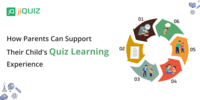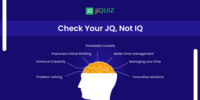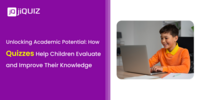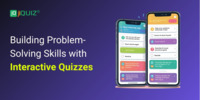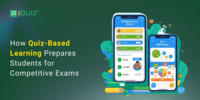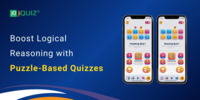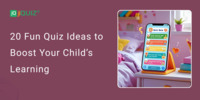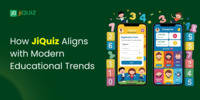- Jun 30, 2025
Share this post on:

For decades, the classroom experience remained relatively unchanged. Chalkboards, textbooks, and lectures were the norm. But the 21st century has ushered in a seismic shift: the rise of Educational Technology, or EdTech. This transformation isn't just about replacing textbooks with tablets; it's fundamentally changing how we learn, teach, and assess knowledge. And at the heart of this change, often surprisingly, lies the humble quiz. This blog post will explore the evolution of EdTech, delve into the powerful role quizzes are playing, and look ahead to how they are shaping the future of learning.
1. The EdTech Evolution: From Early Adoption to a Learning Revolution
The concept of EdTech isn't entirely new. Early iterations included educational films and radio programs. However, the true revolution began with the proliferation of computers in schools in the 1980s. The initial focus was primarily on computer-assisted instruction (CAI), often presenting pre-programmed lessons and drills. While offering some advantages over traditional methods, CAI often lacked interactivity and personalization.
The internet changed everything. The rise of online learning platforms in the late 1990s and early 2000s, like Blackboard and Moodle, provided a foundation for broader digital learning. However, these early platforms were often cumbersome and lacked the engaging features we see today.
The real acceleration occurred with the rise of mobile devices and cloud computing. This led to the development of more user-friendly, accessible, and interactive learning tools. Key milestones include:
- Massive Open Online Courses (MOOCs): Platforms like Coursera, edX, and Udacity democratized access to education, offering courses from top universities worldwide.
- Gamification of Learning: Incorporating game mechanics like points, badges, and leaderboards to increase motivation and engagement.
- Personalized Learning Platforms: Using data analytics to tailor learning paths and content to individual student needs.
- Adaptive Learning: Systems that adjust the difficulty and content based on a student's performance in real-time.
- The Pandemic's Impact: The COVID-19 pandemic forced a rapid and widespread adoption of EdTech, accelerating innovation and solidifying its place in education.
2. Quizzes: More Than Just Grades – A Multifaceted Tool
For many students, the word "quiz" evokes feelings of stress and anxiety. Traditionally, quizzes have been viewed primarily as a tool for assessment and grading. However, in the context of modern EdTech, their role has expanded significantly. They’re now integral to the learning process itself, serving a variety of functions:
- Formative Assessment: This is arguably the most important shift. Formative quizzes aren't about assigning a final grade; they’re designed to provide feedback to both the student and the instructor during the learning process. They highlight areas where a student is struggling and allow for adjustments to teaching strategies.
- Knowledge Retention & Recall: Regular, low-stakes quizzes encourage spaced repetition, a proven technique for improving long-term memory. The act of recalling information, even if incorrect, strengthens neural pathways.
- Self-Assessment & Metacognition: Quizzes can help students gauge their understanding and identify areas where they need to focus their efforts. This fosters metacognition - thinking about one’s own thinking.
- Motivation & Engagement: Well-designed quizzes can be engaging and fun, particularly when incorporating gamification elements.
- Personalized Learning Paths: Adaptive quiz platforms use responses to dynamically adjust the content a student receives, ensuring they are challenged appropriately.
3. Types of Quizzes in the EdTech Landscape
The evolution of EdTech has led to a variety of quiz formats, each serving a slightly different purpose:
- Multiple Choice Questions (MCQs): Still a mainstay, MCQs are easily automated and can assess broad understanding. EdTech platforms are increasingly using sophisticated algorithms to analyze answer patterns and identify common misconceptions.
- True/False Questions: While simple, these can be effective for testing recall of specific facts.
- Matching Questions: Useful for assessing understanding of relationships between concepts.
- Short Answer/Essay Questions: While more challenging to grade automatically, advancements in natural language processing (NLP) are enabling automated essay scoring, providing valuable feedback to students.
- Drag-and-Drop Activities: Engaging and interactive, these are great for testing understanding of sequencing and relationships.
- Interactive Simulations & Scenarios: These offer a highly immersive learning experience, allowing students to apply their knowledge in realistic contexts. Quizzes within these simulations can assess decision-making skills and problem-solving abilities.
- Micro-Quizzes: Short, focused assessments that can be completed in a few minutes. These are ideal for reinforcing key concepts and promoting frequent knowledge checks.
4. The Technology Behind the Quiz Revolution
Several technological advancements are driving the transformative role of quizzes in EdTech:
- Learning Management Systems (LMS): Platforms like Canvas, Schoology, and Google Classroom provide a centralized hub for delivering content, managing assignments, and tracking student progress. They often integrate seamlessly with various quiz tools.
- Adaptive Learning Platforms: Companies like Knewton and Dreambox Learning utilize algorithms to personalize learning paths based on student performance on quizzes and other assessments.
- Artificial Intelligence (AI) & Machine Learning (ML): AI is being used to analyze quiz data to identify learning patterns, predict student performance, and generate personalized feedback. ML algorithms can also automate quiz generation and grading.
- Natural Language Processing (NLP): As mentioned earlier, NLP is enabling automated essay scoring and providing more nuanced feedback on short answer responses.
- Gamification Engines: These platforms allow educators to easily incorporate game mechanics into their quizzes and learning experiences.
- Cloud Computing: Provides the infrastructure for storing and processing the vast amounts of data generated by online quizzes and assessments.
5. Future Trends: The Next Generation of Quiz-Based Learning
The evolution of quiz-based learning is far from over. Here are some emerging trends to watch:
- Virtual Reality (VR) and Augmented Reality (AR) Quizzes: Imagine taking a quiz within a virtual museum or dissecting a virtual frog! VR and AR will create immersive and engaging quiz experiences.
- AI-Powered Personalized Feedback: Future quizzes will provide incredibly detailed and personalized feedback, going beyond simply identifying incorrect answers to explaining why a student made a mistake and suggesting specific resources for improvement.
- Blockchain-Based Credentials: Blockchain technology could be used to create secure and verifiable digital credentials based on quiz performance, providing students with portable records of their learning achievements.
- Emotion Recognition: AI algorithms could potentially analyze students' facial expressions and physiological responses during quizzes to gauge their level of engagement and identify areas of frustration.
- "Serious Games" with Integrated Assessment: Games designed with specific learning objectives and seamlessly integrated quizzes to assess progress.
- Focus on Skills-Based Assessment: Moving beyond rote memorization to assess critical thinking, problem-solving, and creativity through complex, scenario-based quizzes.
Conclusion:
The rise of EdTech is transforming the way we learn, and quizzes are at the forefront of this revolution. Moving beyond their traditional role as simple assessment tools, quizzes are now integral to the learning process, providing personalized feedback, promoting engagement, and fostering a deeper understanding of the subject matter. As technology continues to evolve, we can expect even more innovative and engaging quiz-based learning experiences to emerge, shaping the future of education for generations to come. The humble quiz, once a source of anxiety, is poised to become a powerful catalyst for learning and personal growth.

